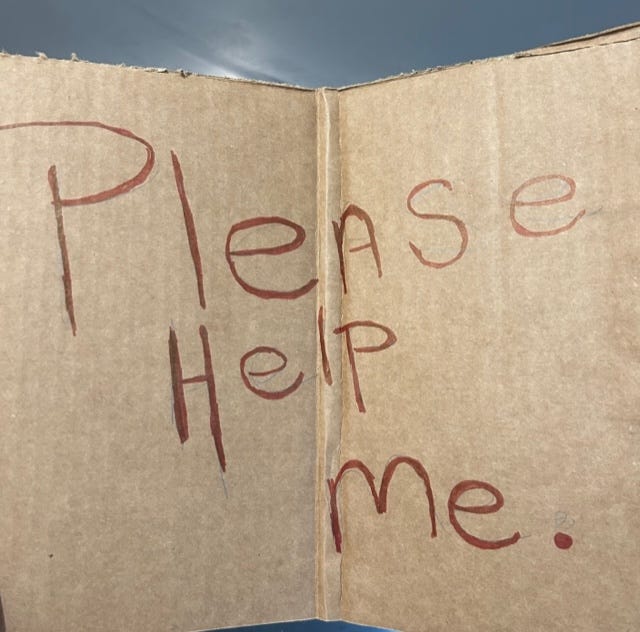Dad's Homelessness
“I knew he was in a bad way, but I never had any idea it was this bad,” I thought to myself as I stood in dad’s house looking at the cardboard sign.
He’d printed with “Please Help Me” in his distinctive handwriting. On the back was written a prayer. “Lord, please bless them 3x for what they give me.”
I’d heard of my dad’s sudden and immediate passing thanks to a stranger’s Facebook message to my mom. A friend of hers from high school had reached out trying to get a hold of my sister and I. They knew that at one time my parents had been married—so long ago that I’d never known their marriage together. She texted us asking if we’d heard from dad recently. My sister hadn’t spoken to him in years, but I’d only recently stopped talking to him a few months before.
Our falling out was precipitated by his continued criticism of my grandfather, his father, as an awful human being and a tyrant. The grandfather I’d known was loving and generous, and my dad had been a benefactor of his generosity. He had a home to live in rent-free for 34 years, and then was gifted that same house when my grandfather passed. Even as my dad was continuing to live in the physical manifestation of his father’s generosity, he was spitting on his memory. It was too much for me, and so we had our falling out.
Dad wasn’t homeless, not technically. But he was about to be if he hadn’t died suddenly that day. The back taxes were more than he’d ever be able to scrape together. We all assumed should have lost the house a couple years before. One silver lining of the pandemic was that he was able to keep it just a bit longer. Mercifully he never had to actually live on the streets. His home was never seized and never auctioned without his consent for his unpaid years of property taxes.
I learned of his passing by calling the county coroner. After getting the text from my mom, I tried to contact him. My calls and texts went to an automatic message. “The person you are trying to reach cannot receive your call.” We just assumed he hadn’t paid the bill on his burner phone again.
Sitting there in the WeWork phone booth on a work trip to Los Angeles, I learned the truth. Standing in his house days later, I learned his reality. He’d given up on shuffling down to the Home Depot seeking day labor jobs and had gone to the street corner instead. We found his rolling bag with a yo-yo and a book for when things were slow. We also found a knife. I hope he never had to use it.
The house itself had long since fallen into disrepair. I’d begged him countless times to sell it and use the money to pay rent on an apartment closer to me so that I could help him and he could know his grandchildren. He never would, saying it was the only thing he had left of value, the only thing he could give to his grandchildren. It was also the only thing keeping him from receiving a host of government benefits. But also the only thing shielding him from the elements. So I guess it was a fair trade.
We’re selling it now, my sister and I. We took turns saying goodbye in each room of our childhood home that had sheltered us for years. It hadn’t always had the nicotine stains and cobwebs. It once had love inside. Now it was just a shell.
I stole down to the house alone, a six hour round trip just to say goodbye. I doubled over with grief in each room before turning off the lights one final time. Weeping at the loss of an anchor to my childhood and the death of a parent. I needed to be there alone so I wouldn't have to hold back the tears.
Dad wasn’t homeless, but he should’ve been. Maybe he would have been if he’d lived longer. In his mind he felt homeless. He told me so on a voicemail that I listen to when I want to hear his voice. In it he’s upbeat and happy about having a working toilet again. Small blessings. It’s good to hear him be happy despite the subject.
I’m keeping the sign. It’s in my garage in a corner behind some things so my kids won't find it without effort. They barely remember their grandfather from the few trips up on Thanksgiving and Christmas when my wife and in-laws convinced me to pay for his travel and lodgings. I’m thankful now that they forced me. I wasn’t happy at the time and drowned my nerves with alcohol to get through the day.
My wife tells me to throw that sign away. It was dad’s lowest and most embarrassing moment. He wouldn’t want to be remembered that way.
I see it differently. I’m used to ignoring the people on the road asking for money. I’ve thought, “Go get a job, stop begging for money.” My perspective has now changed. That cardboard sign is a reminder to keep my heart soft. Second, if it was my dad’s lowest and most embarrassing moment then I want to be there beside him so that he’s not alone.
The story continues at The Inheriquest, where Matthew considers some of the items his dad left behind (trading cards, comics, action figures) and decides what to do with them.
Also, be sure to check out his excellent publication Matt Likes Coffee., in which he writes about drinking coffee, reviews coffee shops, and touches on other topics.





Incredibly moving.
It does leave me wondering, was their hurt from his own dad that your dad hadn’t healed from?
Thank you for sharing your story.